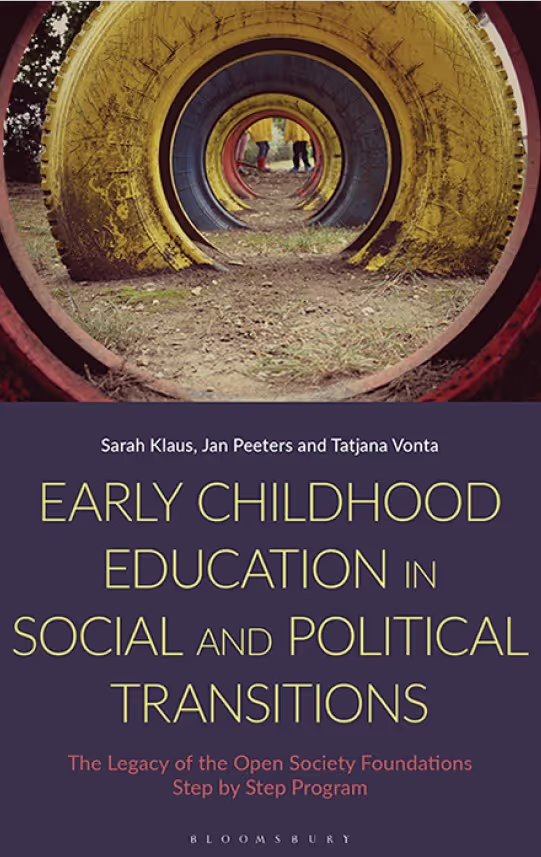OSF Book
Step by Step Program

Step by Step Program | A Living History
Welcome to the Supplementary Webpages for Early Childhood Education in Social and Political Transitions: The Legacy of the Open Society Foundations Step by Step Program
Authors: Sarah Klaus, Jan Peeters, Tatjana Vonta
Explore the journey of early childhood education pioneers across Central, Eastern, and
Southern Europe (CEE) and Eurasia and beyond following the pivotal democratic transitions of the 1990s and discover the origins of the International Step by Step Association.
About the book This open access book describes the extraordinary journey of early childhood education pioneers across Central, Eastern, and Southern Europe (CEE) and Eurasia during the pivotal democratic transitions of the 1990s. More than...read more
About the authors In late 2019, Jan Peeters was stirred by news of the decision by the Open Society Foundations to wind down its work in early childhood. Seeking to...read more
Additional resources Access supplementary resources to enrich your understanding and exploration of the Step by Step program, including methodologies, films, and reports. Click here.
History of the program Discover the origins, evolution, and enduring impact of the early childhood education program central to our book's narrative, exploring key milestones, challenges, and its contribution to inclusive, child and family-centered education across the region and beyond. Click here.
Media Learn about book-related events, podcasts, and other media. Click here.
Join the Conversation Be part of the dialogue surrounding early childhood education and social change. Connect with us on social media for updates and exclusive content and share your own insights and experiences with our community of educators, advocates, and change-makers.


Step by Step Program
This open access book describes the extraordinary journey of early childhood education pioneers across Central, Eastern, and Southern Europe (CEE) and Eurasia during the pivotal democratic transitions of the 1990s. More than just a historical account, it weaves together new interviews and unpublished reports, offering firsthand insights from dedicated practitioners, researchers, and policymakers. Their narratives illuminate the transformation of approaches to early childhood education during a time of significant change. The book highlights the experiences of young children and their families affected by social and political reforms, including those who face poverty, discrimination and war. It traces the extension of Step by Step-inspired programs to Latin America and the Caribbean, Africa and Asia exploring how democratic early childhood education takes different shapes in new contexts.
What truly sets this book apart are the resounding voices of educators, experts, and NGO leaders, united under the Open Society Foundations Early Childhood Program. Together, they forged a powerful movement, inspiring change and promoting democratic values and social inclusion. Their narratives offer invaluable lessons for the early childhood education and international development communities.
An essential read for those eager to catalyze positive change and embrace inclusive early childhood development, it serves as a guide for policy makers as well as professionals in foundations, NGOs, education, social services, and academia.
The ebook editions of this book are available open access under a CC BY-NC-ND 4.0 licence on bloomsburycollections.com. Open access was funded by the Open Society Foundation (OSF).
Reviews of the book
"In the face of insurmountable obstacles generated by poverty in low democracy states this is a book that provides hope through a remarkable insight into how the Open Society contributed to global early childhood education (ECE). Over a period of three decades from the 1990s it follows the work of the Step by Step programme. The authors have captured how systemic support for ECE can help ameliorate inequality for young children. A must read for anyone wanting to see how sustainable change is possible."

"The encouraging message of this book is strengthening early childhood practitioners' readiness for change, dealing with resistance to change and creating inclusive, democratic and qualitative education for young children. Although this book explores Step by Step and Open Society's Early Childhood Program, the content, different topics and theoretical analysis have a universal application in the phenomenology of transforming ECEC in general."

"What sparked the transformative wave in early childhood education across Central, Eastern, and Southern Europe, and the former Soviet Union after the fall of the Berlin Wall? Dive into a compelling first-hand narrative that chronicles the journey of the Step by Step program from model kindergartens to a global movement, championing inclusive, creative, and democratic learning environments. An essential read for anyone passionate about the power of education in shaping open societies."

Webinar
Co-hosted by the International Step by Step Association and Georgetown University, introducing Early Childhood Education in Social and Political Transitions and celebrating thirty years of the Step by Step Program.
Podcast
Who Says We Can’t Change the World? A Podcast on Early Childhood Education and Societal Change
We are excited to share a special podcast titled Who Says We Can’t Change the World?—an inspiring conversation about Early Childhood Education in Social and Political Transitions, a new Open-Access book published by Bloomsbury Academic. Listen to an engaging discussion about how civil society catalyzed democratic reform of early childhood education following the political transitions of the 1990s in Europe and Eurasia from three experts involved in introducing the Step by Step Program in newly democratic states.
In this episode, you’ll hear:
- What motivated one of the largest investments in global early childhood education: introduction in 30 countries of the Open Society’s Step by Step Program aimed at reforming early childhood education across Central Eastern Europe and Eurasia, following the Fall of the Berlin wall.
- How Ministries of Education, educators, young children and their families reacted to the introduction of innovative, democratic practices in kindergartens and primary schools.
- The challenges of working to introduce reform of teacher training institutions and of shifting attitudes towards Roma and children with disabilities.
- How democratic ideas motivated the establishment of practice and research-focused networks dedicated to social inclusion and innovation in early childhood.
- The relevance of lessons learned for the early childhood field of today.
Meet the speakers:
- Sarah Klaus, co-author and Adjunct Assistant Professor, Georgetown University Center for Child and Human Development
- Carmen Lica, Director of the Step by Step Center for Education and Professional Development (CEDP) Romania
- Iveta Silova, Professor and Associate Dean of Global Engagement
- Ros Taylor, Podcaster, Journalist and Moderator
In Person Book Launch Event - October 22-24, 2024
The co-authors gathered for an in-person event at ISSA Conference 2024 in Sofia Bulgaria, focused on the theme: It Takes an Early Childhood Ecosystem for All Children to Thrive
Resources
Welcome to our Step by Step Program Resource Page, where you will find a wealth of methodological and practical tools, inspiring films, and in-depth evaluations of Step by Step and related programs that support child-centered learning and inclusive education. Explore our diverse offerings below to enhance your educational initiatives and advocacy efforts.
Films
Discover our compelling film series that highlights the transformative power of education and community support for children around the world. Our featured films were launched in 2001, at the height of the Step by Step program and they include:
- Step by Step: School Success for Roma Children: An inspiring look at educational initiatives that are breaking down barriers and fostering academic success for Roma children.
- Step by Step: Children Are Our World: A heartwarming exploration of the universal importance of nurturing and educating young children as the foundation for a better future.
- Step by Step: Country Films: A diverse collection of stories showcasing the unique challenges and triumphs of educational programs in various countries.
ISSA Journals
Between 2000 and 2005 the International Step by Step Association produced nine Issues of the Journal Educating Children for Democracy. The journals feature lively articles about Step by Step and child-centered early education written by regional and international early childhood pedagogues and experts. To view the journals, click here.
- Number 1: Summer/Fall 2000
- Number 2: Winter/Spring 2002 Family and School Partnerships
- Number 3: Summer/Fall 2002 Family and Community Involvement
- Number 4: Winter/Spring 2003 Learning Through Play
- Number 5: Summer/Fall 2003 Child-Centered Education: Roots, Renewal and Growth
- Number 6: Winter/Spring 2004 Early Childhood: A Global Concern
- Number 7: Summer/Fall 2004 Quality in Early Childhood Education
- Number 8: November 2004 A Decade of Steps in Educational Reform
- Number 9: Summer/Fall 2005 Transforming Early Childhood Education
Evaluations and Reports
Access evaluations and reports, which offers in-depth analyses and insights into the effectiveness and impact of various educational programs. Our evaluations and reports are listed below. To view or download, click here.
- Evaluation of the Step by Step Program (Education Development Center, 1998) - Executive Summary: A thorough assessment of the Step by Step program's implementation and outcomes.
- Master of Science in Early Childhood Development: Selected Summaries of Student Research (Institute of Education Development, BRAC-IED, Dhaka, 2010): Summaries of notable research conducted by graduate students in the field of early childhood development.
- Building Open Societies Through Quality Early Childhood Care and Education: Case Studies of the Step by Step Program: Case studies demonstrating how quality early childhood education can contribute to the development of open, inclusive societies.
- Starting Strong Evaluation: Impact Evaluation Research Brief (June 2019): A research brief highlighting the impacts and outcomes of the Starting Strong evaluation.
- Starting Strong Evaluation Policy Brief (June 2019): A policy brief offering key recommendations based on the findings of the Starting Strong evaluation.
- Consolidated Final Report: Evaluation of the Program for Children and Parents – Dam Len Phaka’ (April 2019): The final report evaluating the program designed to support children and parents.
- Creating Financing and Governance Preconditions for Inclusive Early Childhood Development and Education Systems: Latvia, Serbia, Bulgaria, Ukraine, and Lithuania (2015): An analysis of the financial and governance conditions necessary for inclusive early childhood development and education systems in various countries.
Step by Step Methodologies
Explore the comprehensive pedagogical manuals that form the core of the Step by Step program. Step by Step methodologies summarize theoretical concepts and feature expert guidance and practical tools for educators dedicated to fostering child-centered learning environments and inclusive education. Step by Step methodological resources complement national curricula. They describe ‘how’ to structure child-centered learning environments, not ‘what’ to teach. Over the course of the program Step by Step produced nine methodological guidebooks listed below. For more detailed descriptions or to download the methodologies, click here.
- Creating Child-Centered Programs for Infants and Toddlers: Strategies for designing nurturing and engaging programs tailored to the youngest children.
- Learning Activities for Infants and Toddlers: An Easy Guide for Everyday Use: A collection of simple, everyday activities to promote development and learning in infants and toddlers.
- Creating Child-Centered Classrooms: 3-5 Year Olds: Best practices for establishing classrooms that prioritize the needs and interests of preschool-aged children.
- Creating Child-Centered Materials for Math and Science (3-6 year olds): Guidance on developing math and science materials that engage young children in hands-on, exploratory learning.
- Creating Child-Centered Classrooms (6-7 year olds): Tips and techniques for creating engaging, developmentally appropriate classroom environments for early elementary students.
- Creating Child-Centered Classrooms (8-10 year olds): Insights on fostering supportive and stimulating learning spaces for older elementary students.
- Creating Inclusive Classrooms: Strategies for developing inclusive educational settings that accommodate and celebrate diverse learning needs and backgrounds.
- Making a Difference: A Parent’s Guide to Advocacy and Community Action: Practical advice for parents on advocating for their children’s education and becoming active participants in community initiatives.
- Education and the Culture of Democracy: Early Childhood Practice: Exploring the role of early childhood education in promoting democratic values and practices.
Step by Step Training Catalogue
During its first decade, the Step by Step Program developed a library of training resources. These comprehensive, interactive trainings were accompanied by in-person mentoring to support the introduction of robust in-country early childhood development programs in participating countries.
Step by Step Training Modules:
- Infants and Toddler Programs
- Preschools
- Primary Schools
- Transition to Middle School
- Instructional Strategies for Children with Disabilities (Preschool and Primary modules)
- Parent Advocacy
- Parenting: Getting Ready for School
- Parenting with Confidence (versions for infants/toddlers and for children birth to six)
- Training of Trainers (Beginning and Advanced)
- Training of Mentors
- Planning and Operating model Step by Step Training Sites
- Classroom Management
- Cooperative Learning
- School Improvement Program
Professional Development for Higher Education Faculty (Semester-Length Courses)
Step by Step developed and disseminated nine semester-length university courses:
- Child-Centered Curriculum
- The Study of Children Through Observation and Recording
- School and Family Partnerships
- Individualized Teaching in Early Childhood Education
- Learning Through Play
- Applied Research in Early Childhood Education
- Teacher as Researcher: Using Applied Research in the Classroom
- Creating Successful Practicum Program for Student Teachers
- Teaching in the Inclusive Early Childhood Classroom
- School and Family Partnerships: A Course for Early Childhood Faculty
To learn more about these resources and the possibility of accessing training, contact info@issa.nl.
Step by Step Program | A History
This book examines the transformative journey of the Open Society Foundations Step by Step program in Europe and Eurasia, which inspired the establishment of non-governmental organizations and the International Step by Step Association. Step by Step emerged as a powerful force for democratic reform through early childhood education (ECE) during the social and political transitions that followed the Fall of the Berlin Wall in 1989. Rooted in the core beliefs of investing in people and fostering civil society, Step by Step grew into a regional movement for child-centered, family and community-focused, inclusive education.
The early childhood education landscape in former communist-led countries grew out of the need to enable women’s participation in the workforce and a wish to promote children’s development and instill collective values. Services varied widely across the region, however, the collapse of the Soviet Union and of economies in Eastern and Central Europe ushered in economic crises, leading to infrastructure decay and challenges sustaining kindergartens. Step by Step jumped in to help rebuild early education systems in Central Eastern Europe and the former Soviet Union, introducing and strengthening democratic values and practices.
Implementing Step by Step necessitated the collaboration of dedicated individuals capable of driving systemic change within education systems. Open Society leveraged its network of independent national foundations to assemble and support teams of local experts to lead the program in each country and to establish close partnerships with participating governments. Drawing on leadership from Georgetown University and inspiration and expertise from the Head Start program in the US, Step by Step aimed to revolutionize early childhood education in the region by prioritizing child-centered approaches, parent involvement and democratic and equitable values.
Effective communication and community engagement were emphasized, paving the way for Step by Step to gain traction and catalyze a shift towards inclusive practices. The program's impact extended far beyond education, challenging marginalization and exclusion, particularly benefiting groups like Roma children and integrating children with disabilities into mainstream education. Despite obstacles such as war and political pressure, Step by Step facilitated reconciliation and sustained systemic reform, embodying a collective commitment to children's rights and social justice.
The book describes the program's vertical expansion within education systems, starting with preschools and extending downwards to infant and toddler programs and upwards to primary schools and relevant in-service and pre-service academic and vocational training programs. Ultimately, Step by Step expanded its geographic reach from the initial fifteen countries that launched Step by Step in 1994-95, to more than thirty countries, including to complementary initiatives in Argentina, Haiti, Liberia, Bangladesh and Bhutan. Expansion was possible because of close partnerships with national governments, international agencies and donors, including USAID, the World Bank and UNICEF. In 1999, participating countries launched the International Step by Step Association (ISSA), which has played a pivotal role in creating quality standards and professional development frameworks for ECE in Europe and Eurasia. ISSA's journey towards independence and growth underscore its role as a recognized advocate for democratic values in ECE, collaborating closely with ministries, the European Union, international agencies and civil society organizations.
Overall, the book offers reflections on Step by Step's journey, highlighting the importance of sustained efforts, adaptability amid diverse political landscapes, and the importance of investing in people, specifically educators and parents, to shift mindsets and catalyze systemic change. It reinforces the value of thinking big and taking risks, of striving to create visionary programs for young children and families during periods of social and political transition. It underscores the transformative potential of early childhood education in shaping democratic societies, the power of women-led initiatives, and the need to maintain an unwavering commitment to social justice and inclusive practices over many years, despite overwhelming obstacles. Ultimately, the book offers valuable lessons for policy makers and professionals from foundations, NGOs, educators, academics, and other key stakeholders involved in shaping early childhood education.
To access a good overview of the Step by Step program, see Chapter 3 of the book, or read this article, Stepping into the Future: A History of the Step by Step Program, published on the 10th Anniversary of the program.



